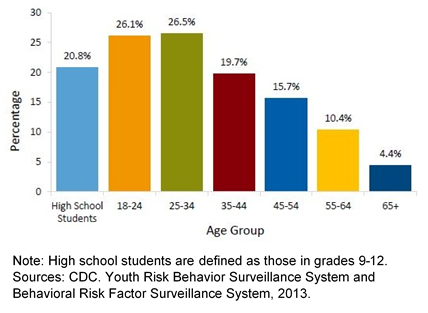Section Branding
Header Content
Health & Alcohol: The Facts
Primary Content
Harmful use of alcohol is a major public health problem in the United States, and Georgia is no exception.
Alcohol has remained the drug of choice for young Americans and is used more than tobacco or illicit drugs. It is undeniable that alcohol has become deeply absorbed in American culture, where it is often perceived as a rite of passage, is frequently facilitated by adults and has proven resistant to change, as reported in the 2007 Surgeon General’s Call to Action.
Binge drinking has become the most common, costly and deadly pattern of excessive alcohol use in the country, reported by the Centers for Disease Control and Prevention (CDC). The CDC defines excessive alcohol as underage drinking, alcohol use by pregnant women, and having more than four or five drinks within a two hour span.
Aligning this definition with the drinking patterns in the state, Georgians binge drink less than the national average (6.9% vs. 8.2%), and they have less drinks when they do. Still, approximately 2,400 deaths occur annually in the state that are linked to excessive alcohol use. On both a national and state level, heavy drinking and binge drinking have increased since 2002, according to Georgia Health News.
There is also an economic cost to alcohol abuse. In 2010, excessive alcohol use cost the U.S. nearly $250 billion. That’s about $2 for every drink sold. In addition to health care and criminal justice costs, the largest economic impact of excessive drinking is lost workplace productivity. In Georgia, the cost translates to about $700 per person. The highest cost is nearly double that, in the District of Columbia.
Across the U.S. there are differences in drinking patterns among men, women and income. The prevalence of binge drinking is twice the prevalence among men than among women. It is most common in people with household incomes of $75,000 or more, than among people with lower incomes. However, low income people tend to binge drink more often and consume more drinks when they do.
The most well known health consequences of excessive alcohol use are violence, which include child maltreatment, domestic abuse, intimate partner violence, homicide,and suicide and also what is labelled as unintentional injuries (car accidents, falls, drownings, burns and firearm injuries). However, it is important to note that short-term health impacts of excessive drinking also include liver cirrhosis, pancreatitis, various cancers ( including liver, mouth, throat, larynx and esophagus), high blood pressure and psychological disorders. Short-term consequences can lead to long-term health issues that affect an individual's functioning, learning, memory, school and work performance, mental health, and social networks.
An essential fact about binge drinking - it is preventable.
With approximately 80,000 deaths a year, excessive drinking has become the third leading preventable cause of death in the country. GPB News All Things Considered delves into the nuances of the ever changing drinking landscape of Georgia.

